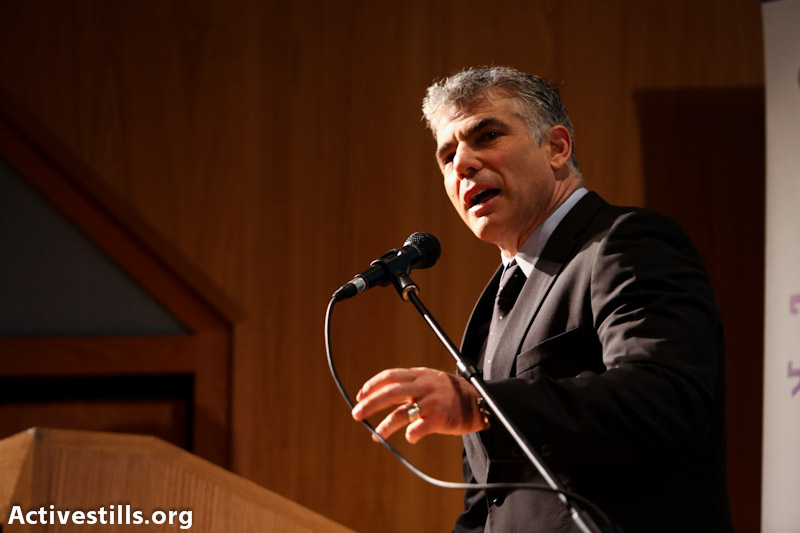On the Palestinian issue, the new leader of the Israeli center holds positions that take several steps back from ideas held by Israeli negotiators in the previous decade.

The surprising success of Yair Lapid in the Israeli elections has led many people to believe that a new window of opportunity could be open for a settlement between Israel and the Palestinians. Lapid himself had said before the elections that he will demand a resumption of negotiations between Israel and the Palestinian Authority.
Lapid did not, however, detail the policy principles which could reignite said negotiations. His party’s platform – available online in Hebrew here – states that no new settlements will be built during the negotiations, but that settlement growth will be allowed within the needs of the population (Article 2). However, the Israeli government has repeatedly agreed in the past –starting with the Oslo agreement – not to built new settlements but only strengthen existing ones. During that time, the settler population in the West Bank alone (not including the annexed territories in East Jerusalem or around it) has risen from 107,000 (in 1992) to 324,000 (2011). For this reason, the international community has demanded the cessation of all settlement activities.
Lapid’s platform for a final status agreement has several other articles which are worth noting: Article 6 states that there will be no territorial compromise in Jerusalem and that the entire city will remain under Israeli control. There is no mention of the holy Muslim sites or the fate of more than 250,000 Palestinians in the area annexed to Israel who currently do not have equal rights. This is a major step back from what Israeli negotiators offered in Camp David (2000), Taba (2001) and Annapolis (2007).
Article 9 could be interpreted as continuous Israeli military authority within the Palestinian state (it could also be understood as such an authority for the time of the negotiations alone). If it is the former, than the idea renders the entire notion of Palestinian sovereignty meaningless.
Unlike Olmert in Annapolis, who agreed to a symbolic right of return – under the notion of “an agreed upon solution to the refugee problem” – Lapid rejects any mention of return.
Here is Lapid’s diplomatic platform (my translation).
1. Israel and the Palestinian Authority will return to the negotiating table out of good will and the desire to reach a final agreement.
2. During the negotiations no new settlements will be built, but until a final agreement has been reached, the natural growth in the settlements will be taken into consideration.
3. The goal of the negotiations is to reach two nation-states with recognized international borders that have no demands from each other.
4. These borders will take into account Israel’s security considerations and the reality that has been created since 1967. Both sides will recognize that it is in their mutual interest to leave the settlement blocs in Israel’s hands. If necessary, there will be negotiations over land swaps.
5. The refugees will be settled within the future Palestinian state.
6. Jerusalem is the eternal capital of Israel and its unification is a national symbol of the first measure. Jerusalem will remain united under Israeli sovereignty because Jerusalem is not just a place or a city, but the center of the Jewish-Israeli ethos and the holy place for which Jews longed throughout all generations.
7. The complete halt of incitement against Israel in the Palestinian education system will be part of any future agreement.
8. Israel will not conduct negotiations with Hamas as long as it won’t change its charter and recognize Israel and the right of the Jewish people to exist on its land.
9. The war on terror will continue at all time, without any regards to the negotiations. Israel reserves the right to act for its security in the areas of the future Palestinian state to the extent it deems fit.
10. The world’s nations will provide guarantees for the fulfillment of the future agreement with clear sanctions in the case of violations.
Yair Lapid presented these positions in a speech he made at the settlement of Ariel during the campaign. I don’t find the act of speaking on the Palestinian issue in a settlement a problem, as some others did, but rather the opposite. Still, it should be noted that Lapid’s positions represent a major step back from those laid out by Ehud Barak, Ehud Olmert and even Tzipi Livni, who has been the most hardline. Lapid’s positions are closest to the Prime Minister Netanyahu’s interpretation of the two state-solution in his Bar Ilan speech, which rejected the 1967 borders and a territorial compromise in Jerusalem.
In one of his last interviews before the elections (given to TimeOut Tel Aviv, on January 17th), Lapid said the following on the Palestinian issue:
“I don’t believe a word they [the Palestinians] say.”
Q: Do you think Abu Mazen [Mahmoud Abbas] is a fraud?
“Yes I think he is a fraud, and I think this is the way we should negotiate with him… out of this mistrust I am saying: ‘let’s go to negotiations on two states for two people, but in a state of total mistrust.’ My goal is not to marry them but to divorce them.”
Ralated:
What Yair Lapid’s anti-Zoabi comments reveal about Israeli politics
Yair Lapid: The rise of the tofu man
Ten post-election, pre-coalition takeaways

